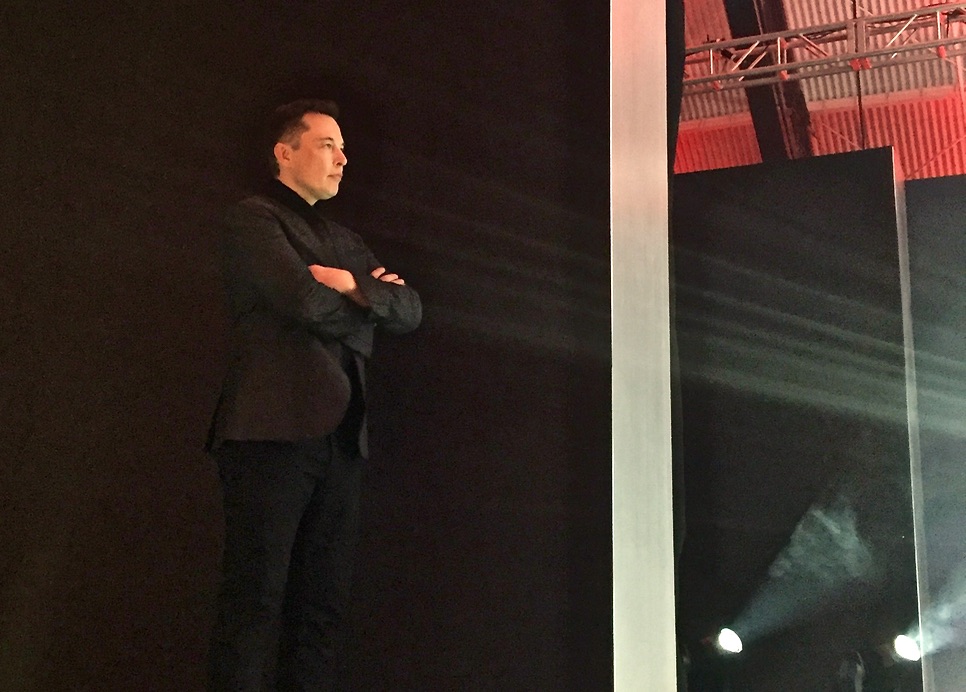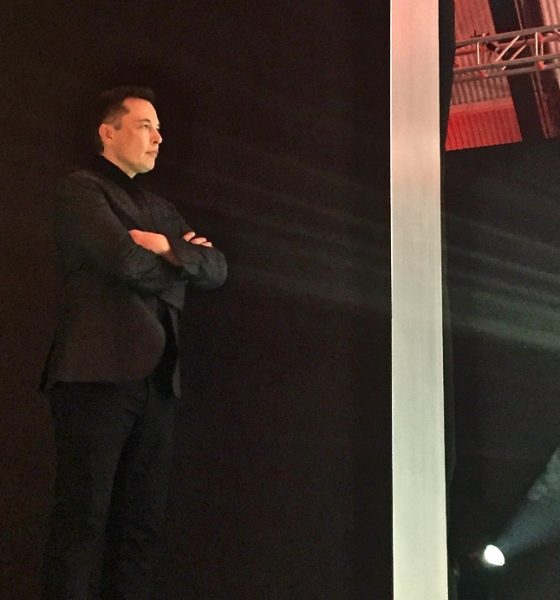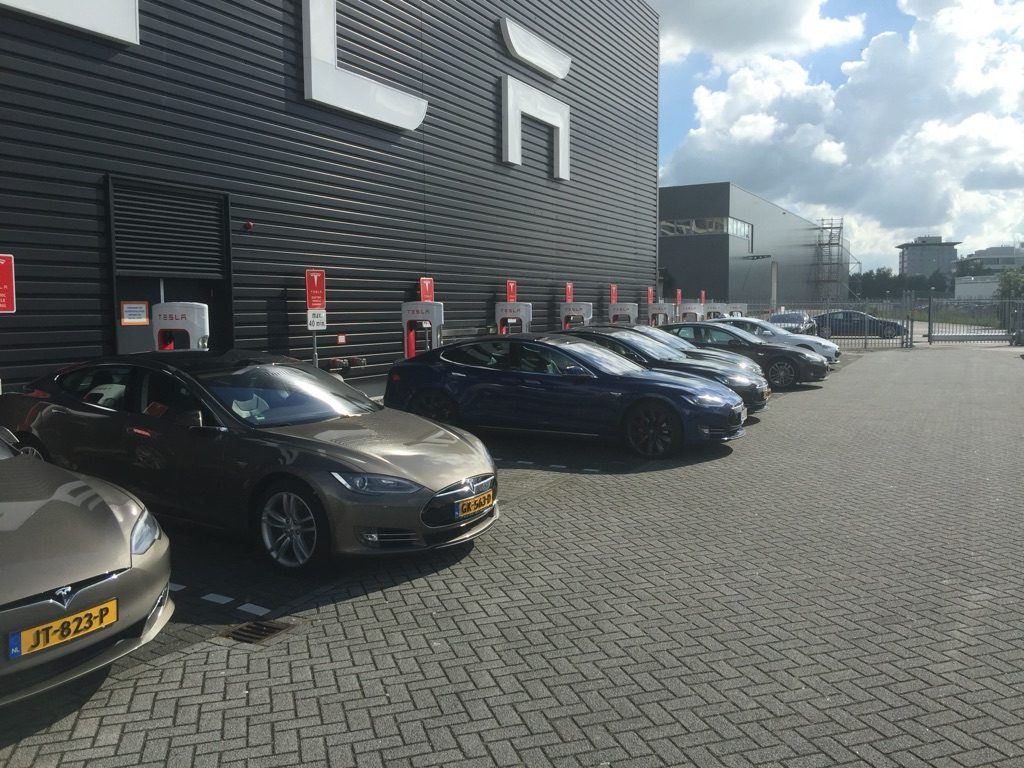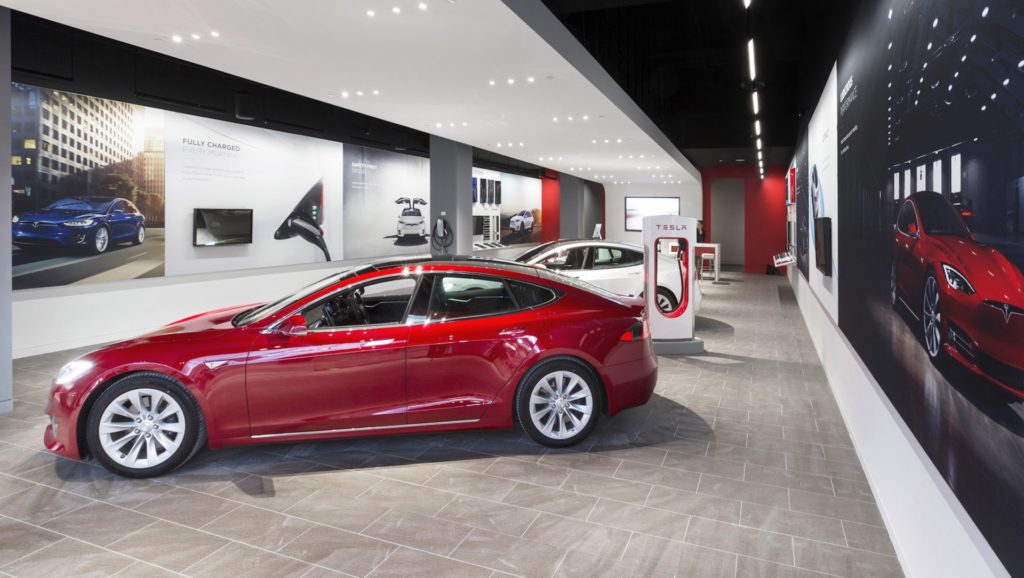

Investor's Corner
The epic battle between Elon Musk and the Tesla haters
In a fascinating article in Institutional Investor, Michelle Celarier writes that Tesla [NASDAQ: TSLA] is: “the biggest short in the U.S. market; about 27 percent of Tesla’s free float is short, for a value as high as $10 billion” according to S3 Analytics, a firm that tracks short sales. That said, “the stock has soared more than 1,300 percent since Tesla went public in 2010. It is the first automaker to go public since Ford in 1956, making it one of the darlings of the post-financial-crash bull market.”
It turns out that one of the most notorious Tesla shorts is Mark Spiegel. And Spiegel hasn’t even driven a Tesla yet. He says, “I’m more into sports cars.” According to Celarier, “Spiegel has become something of a zealot on Tesla. His small hedge fund, Stanphyl Capital Management, runs a mere $8.5 million, given that it was down 20 percent this year through August. That’s largely due to his short of Tesla, which had gained 74 percent this year, making it the worst-performing short of the year.”
However, there are bigger players out there shorting Tesla. Celarier reports that: “Everyone who’s anyone in Wall Street’s small and clubby world of short sellers has been short Tesla at one point or another… In the past, some of them also shorted Google and Amazon — other high flyers who weren’t making a profit — and somewhat sheepishly [now] admit they were wrong. Clearly, these guys are not dreamers from California’s La La Land, and Musk’s grand plans and his ‘save the world’ ethos can elicit a few eye rolls.”
Another well-known Tesla short, James Chanos of Kynikos Associates, “has been railing against Tesla for at least two years on CNBC and at numerous conferences. He has gone so far as to call Tesla a cult.” Speaking of Tesla’s CEO Elon Musk, Chanos proclaims, “People want to believe he’s some sort of visionary… In a milieu of boring people, they think he is changing the world. He’s not boring. He’s somebody they can attach their hopes and dreams to.”
So why does Tesla attract so many arguments on Wall Street? On the one hand, “Looking at its balance sheet, Tesla is [considered] the perfect short. But its pioneering status in an industry facing wrenching technological upheaval, and its charismatic CEO, has won it legions of admirers and turned it into a battleground stock. Sure, Tesla’s lofty stock price makes it a risky buy — but also a perilous short.”
Anger and hope permeate both camps of investors. “Short sellers berate Tesla investors as momentum chasers, tree-huggers, or simply Elon Musk groupies, but these investors have bought into a vision that has already made great leaps toward building a sustainable energy ecosystem — a costly endeavor that has no shortage of well-heeled enemies.”
And while an army of short sellers persist, plenty of Wall Street’s power players remain steadfast Tesla longs: “The biggest holders, aside from Musk, are mutual funds like Fidelity Investments, which has owned the stock since the IPO. With a current 12.8 percent stake (down from a high of 15 percent), the mutual fund giant is the largest institutional investor in Tesla, and portfolio manager Kyle Weaver says Fidelity has a long-term perspective on the company that is playing out largely as expected.”

Tesla fleet lined up outside of the service center in Amsterdam [Photo credit: Teslarati App]
“It was the worst short I’ve ever had,” says Whitney Tilson, managing partner of Kase Capital Management, who was short when the stock went from $35 to $205. Last month, Tilson told investors he’s shutting down his funds due to poor performance. Tilson explains, “I can do the numbers and see how much money the company is losing, but you’re short an incredibly maniacally driven CEO, with maniacally driven engineers assaulting the world’s largest industry. If they succeed, Tesla could be a $400 billion market cap company.”“The internal combustion engine is toast long term. It’s game over. The costs of making an internal combustion engine do not go down, while the cost of battery technology has gone down every year,” says Fidelity’s Weaver. “The secular trends that will drive Tesla’s fundamentals are a decades-long trend.” He also applauds Tesla’s environmental mission, “I don’t want to bet against that in an emotional sense.”
Musk is also not afraid to openly attack Wall Street’s short sellers. Let’s not forget, “Musk, who has talked about being bullied as a child, seems to delight in taunting his tormentors. In 2013 he gloated on Twitter, ‘Seems to be some stormy weather over in Shortville these days,’” and once cautioned short sellers that a “tsunami of hurt” was coming in a televised interview.
Celarier writes, “To be sure, a mania surrounds Tesla… [and] betting against Musk is a tough proposition. Tesla has already survived near-bankruptcy events, and Musk has plenty of friends in tech companies with much higher valuations, like Larry Page at Google, that could afford to partner with Tesla or take it over. (Google had struck a handshake deal to buy Tesla during a near-death moment in 2013, according to Vance’s biography.)”
There’s also massive opportunity for Tesla in China: “Earlier this year, China’s Tencent Holdings took a 5 percent stake in Tesla. China is proposing to mandate a zero-emissions standard in 12 percent of new cars by 2020 and is considering letting wholly owned foreign electric-car companies operate there. The Chinese market is expected to be huge, and Tesla is charging ahead there. It is already building a new supercharger network in the country and plans to both build and sell cars there.”
Such realities make shorting Tesla, for all its financial shortcomings, a difficult call. As Tilson puts it, “I don’t want to be short open-ended situations. The tail risk is just too high.”
===
Note: Article by Matt Pressman, originally published on evannex.com
Source: Institutional Investor

Elon Musk
Tesla stock gets latest synopsis from Jim Cramer: ‘It’s actually a robotics company’
“Turns out it’s actually a robotics and Cybercab company, and I want to buy, buy, buy. Yes, Tesla’s the paper that turned into scissors in one session,” Cramer said.

Tesla stock (NASDAQ: TSLA) got its latest synopsis from Wall Street analyst Jim Cramer, who finally realized something that many fans of the company have known all along: it’s not a car company. Instead, it’s a robotics company.
In a recent note that was released after Tesla reported Earnings in late January, Cramer seemed to recognize that the underwhelming financials and overall performance of the automotive division were not representative of the current state of affairs.
Instead, we’re seeing a company transition itself away from its early identity, essentially evolving like a caterpillar into a butterfly.
The narrative of the Earnings Call was simple: We’re not a car company, at least not from a birds-eye view. We’re an AI and Robotics company, and we are transitioning to this quicker than most people realize.
Tesla stock gets another analysis from Jim Cramer, and investors will like it
Tesla’s Q4 Earnings Call featured plenty of analysis from CEO Elon Musk and others, and some of the more minor details of the call were even indicative of a company that is moving toward AI instead of its cars. For example, the Model S and Model X will be no more after Q2, as Musk said that they serve relatively no purpose for the future.
Instead, Tesla is shifting its focus to the vehicles catered for autonomy and its Robotaxi and self-driving efforts.
Cramer recognizes this:
“…we got results from Tesla, which actually beat numbers, but nobody cares about the numbers here, as electric vehicles are the past. And according to CEO Elon Musk, the future of this company comes down to Cybercabs and humanoid robots. Stock fell more than 3% the next day. That may be because their capital expenditures budget was higher than expected, or maybe people wanted more details from the new businesses. At this point, I think Musk acolytes might be more excited about SpaceX, which is planning to come public later this year.”
He continued, highlighting the company’s true transition away from vehicles to its Cybercab, Optimus, and AI ambitions:
“I know it’s hard to believe how quickly this market can change its attitude. Last night, I heard a disastrous car company speak. Turns out it’s actually a robotics and Cybercab company, and I want to buy, buy, buy. Yes, Tesla’s the paper that turned into scissors in one session. I didn’t like it as a car company. Boy, I love it as a Cybercab and humanoid robot juggernaut. Call me a buyer and give me five robots while I’m at it.”
Cramer’s narrative seems to fit that of the most bullish Tesla investors. Anyone who is labeled a “permabull” has been echoing a similar sentiment over the past several years: Tesla is not a car company any longer.
Instead, the true focus is on the future and the potential that AI and Robotics bring to the company. It is truly difficult to put Tesla shares in the same group as companies like Ford, General Motors, and others.
Tesla shares are down less than half a percent at the time of publishing, trading at $423.69.
Elon Musk
Tesla to a $100T market cap? Elon Musk’s response may shock you

There are a lot of Tesla bulls out there who have astronomical expectations for the company, especially as its arm of reach has gone well past automotive and energy and entered artificial intelligence and robotics.
However, some of the most bullish Tesla investors believe the company could become worth $100 trillion, and CEO Elon Musk does not believe that number is completely out of the question, even if it sounds almost ridiculous.
To put that number into perspective, the top ten most valuable companies in the world — NVIDIA, Apple, Alphabet, Microsoft, Amazon, TSMC, Meta, Saudi Aramco, Broadcom, and Tesla — are worth roughly $26 trillion.
Will Tesla join the fold? Predicting a triple merger with SpaceX and xAI
Cathie Wood of ARK Invest believes the number is reasonable considering Tesla’s long-reaching industry ambitions:
“…in the world of AI, what do you have to have to win? You have to have proprietary data, and think about all the proprietary data he has, different kinds of proprietary data. Tesla, the language of the road; Neuralink, multiomics data; nobody else has that data. X, nobody else has that data either. I could see $100 trillion. I think it’s going to happen because of convergence. I think Tesla is the leading candidate [for $100 trillion] for the reason I just said.”
Musk said late last year that all of his companies seem to be “heading toward convergence,” and it’s started to come to fruition. Tesla invested in xAI, as revealed in its Q4 Earnings Shareholder Deck, and SpaceX recently acquired xAI, marking the first step in the potential for a massive umbrella of companies under Musk’s watch.
SpaceX officially acquires xAI, merging rockets with AI expertise
Now that it is happening, it seems Musk is even more enthusiastic about a massive valuation that would swell to nearly four-times the value of the top ten most valuable companies in the world currently, as he said on X, the idea of a $100 trillion valuation is “not impossible.”
It’s not impossible
— Elon Musk (@elonmusk) February 6, 2026
Tesla is not just a car company. With its many projects, including the launch of Robotaxi, the progress of the Optimus robot, and its AI ambitions, it has the potential to continue gaining value at an accelerating rate.
Musk’s comments show his confidence in Tesla’s numerous projects, especially as some begin to mature and some head toward their initial stages.
Elon Musk
Tesla director pay lawsuit sees lawyer fees slashed by $100 million
The ruling leaves the case’s underlying settlement intact while significantly reducing what the plaintiffs’ attorneys will receive.

The Delaware Supreme Court has cut more than $100 million from a legal fee award tied to a shareholder lawsuit challenging compensation paid to Tesla directors between 2017 and 2020.
The ruling leaves the case’s underlying settlement intact while significantly reducing what the plaintiffs’ attorneys will receive.
Delaware Supreme Court trims legal fees
As noted in a Bloomberg Law report, the case targeted pay granted to Tesla directors, including CEO Elon Musk, Oracle founder Larry Ellison, Kimbal Musk, and Rupert Murdoch. The Delaware Chancery Court had awarded $176 million to the plaintiffs. Tesla’s board must also return stock options and forego years worth of pay.
As per Chief Justice Collins J. Seitz Jr. in an opinion for the Delaware Supreme Court’s full five-member panel, however, the decision of the Delaware Chancery Court to award $176 million to a pension fund’s law firm “erred by including in its financial benefit analysis the intrinsic value” of options being returned by Tesla’s board.
The justices then reduced the fee award from $176 million to $70.9 million. “As we measure it, $71 million reflects a reasonable fee for counsel’s efforts and does not result in a windfall,” Chief Justice Seitz wrote.
Other settlement terms still intact
The Supreme Court upheld the settlement itself, which requires Tesla’s board to return stock and options valued at up to $735 million and to forgo three years of additional compensation worth about $184 million.
Tesla argued during oral arguments that a fee award closer to $70 million would be appropriate. Interestingly enough, back in October, Justice Karen L. Valihura noted that the $176 award was $60 million more than the Delaware judiciary’s budget from the previous year. This was quite interesting as the case was “settled midstream.”
The lawsuit was brought by a pension fund on behalf of Tesla shareholders and focused exclusively on director pay during the 2017–2020 period. The case is separate from other high-profile compensation disputes involving Elon Musk.










